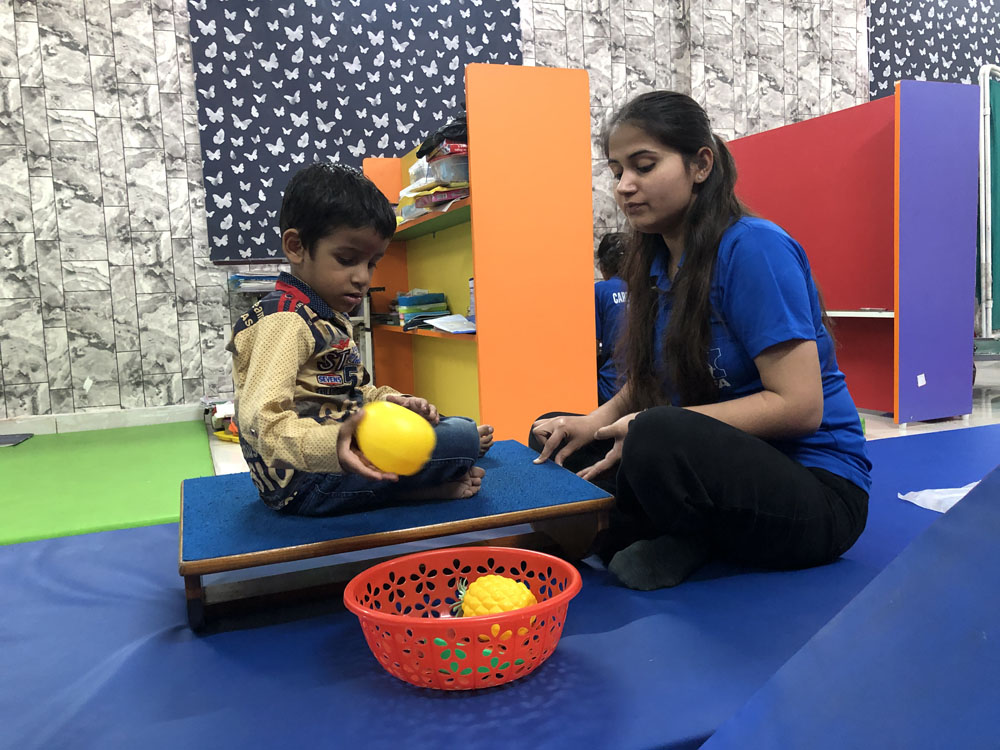Special education is a form of education designed to cater to the unique learning needs of every child. The designing of our special education plan includes speech therapy and occupational therapy in the ratio of one-on-one support from a special educator or a therapist. Special educators prepare individualised education plans (IEPs) for the enrolled childrento develop and address their unique needs and abilities utilising a variety of specialised teaching techniques, technology, and other resources to assist childrenin reaching their maximum potential. Special education is essential to ensure that all children have access to a high-quality education and the resources they need to succeed in school and beyond.
Additionally, CFA has specialized classrooms with various facilities. This includes comfortable and age-appropriate sitting arrangements, coir and foam activity mattresses and sensory integration equipment.
Special educators prepare and conduct different activities according to the child’s needs and goals. Since many children with autism have difficulties with sensory processing, sensory activities arean excellent method to provide structured and predictable sensory input.
We believe that having a comfortable and conducive learning environment is helpful for all students, including those receiving remedial training. Adequate ventilation and temperature control help prevent discomfort and distractions, whichimproves students’ ability to focus, learn and reach their full potential.
Well-trained, sensitized and certified professionals
At our centre, we are committed in providing our students with the highest quality education and support, and we believe that having certified and trained staffis essential to attaining this objective.Our team of educators and professionals consists of experts from the fields of special education, speech therapy, occupational therapy and clinical psychology.In addition to their formal certification, our employees take part in knowledge upgradation programmes offered at our centre, such as faculty development programmes (FDP’s), which are continuing training and professional development initiatives.
School readiness programme
The purpose of a school readiness programme is to prepare children for the transition to formal education. These programmes typically emphasise on pre-academic activities which directly help in the development of cognitive skills as prerequisites for classroom success. Special educators incorporate a variety of activities that are customised to meet the needs and interests of each child. Activities include
- Finger painting- for enhancing finger pointing
- Paper tearing and pasting, Cotton, dal, ear-bud, sticker pasting – for enhancing fine motor skills
- Scribbling (structured/ unstructured)- for enhancing pencil holding
- Sorting- for developing fine motor skills and hand-eye coordination
- Identification –for developing cognitive skills
Creative learning experience
Creative activities is a great way for children with special needs to engage in fun and meaningful experiences, express themselves, and develop important skills.Our special educators adapt these experiences to suit each child’s individual needs and preferences and the activities range from art and music therapy to sports, and nature-based activities.
Attention-building strategies
- Special educators use a variety of techniques to help students with special needs improve their attention span and focus. Activities include-
- Optical fibres and bubble tubes- are used in Occupational Therapy (OT) to provide sensory stimulation and promote relaxation and calming effects for children.
- Cartoon face masks- In this, an educator wears a cartoon mask and interacts with a child via singing poems, it is an effective way to encourage the child to look towards the teacher and increase eye contact. The colourful and playful design of the mask helps to increase the child’s attention.



